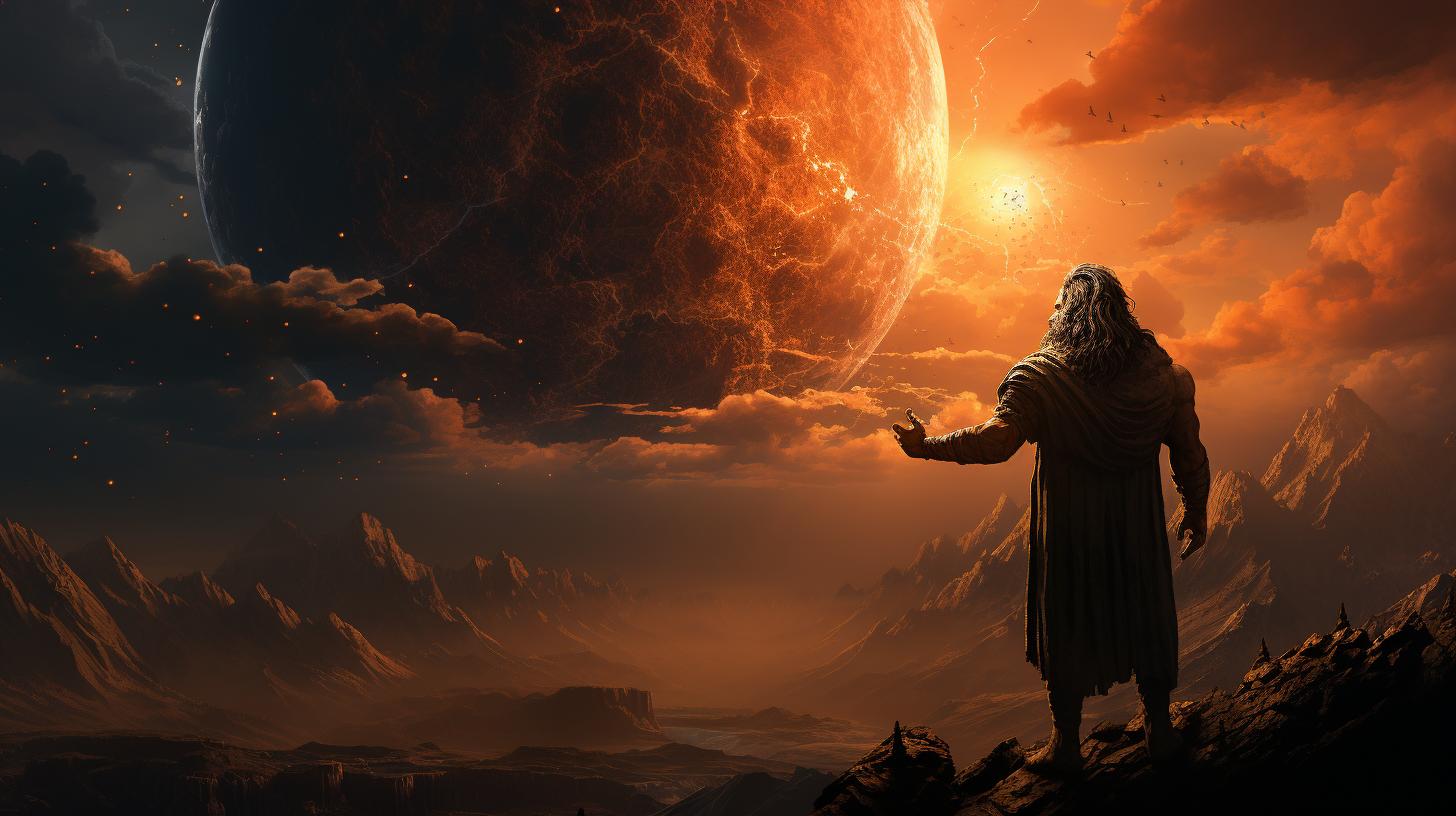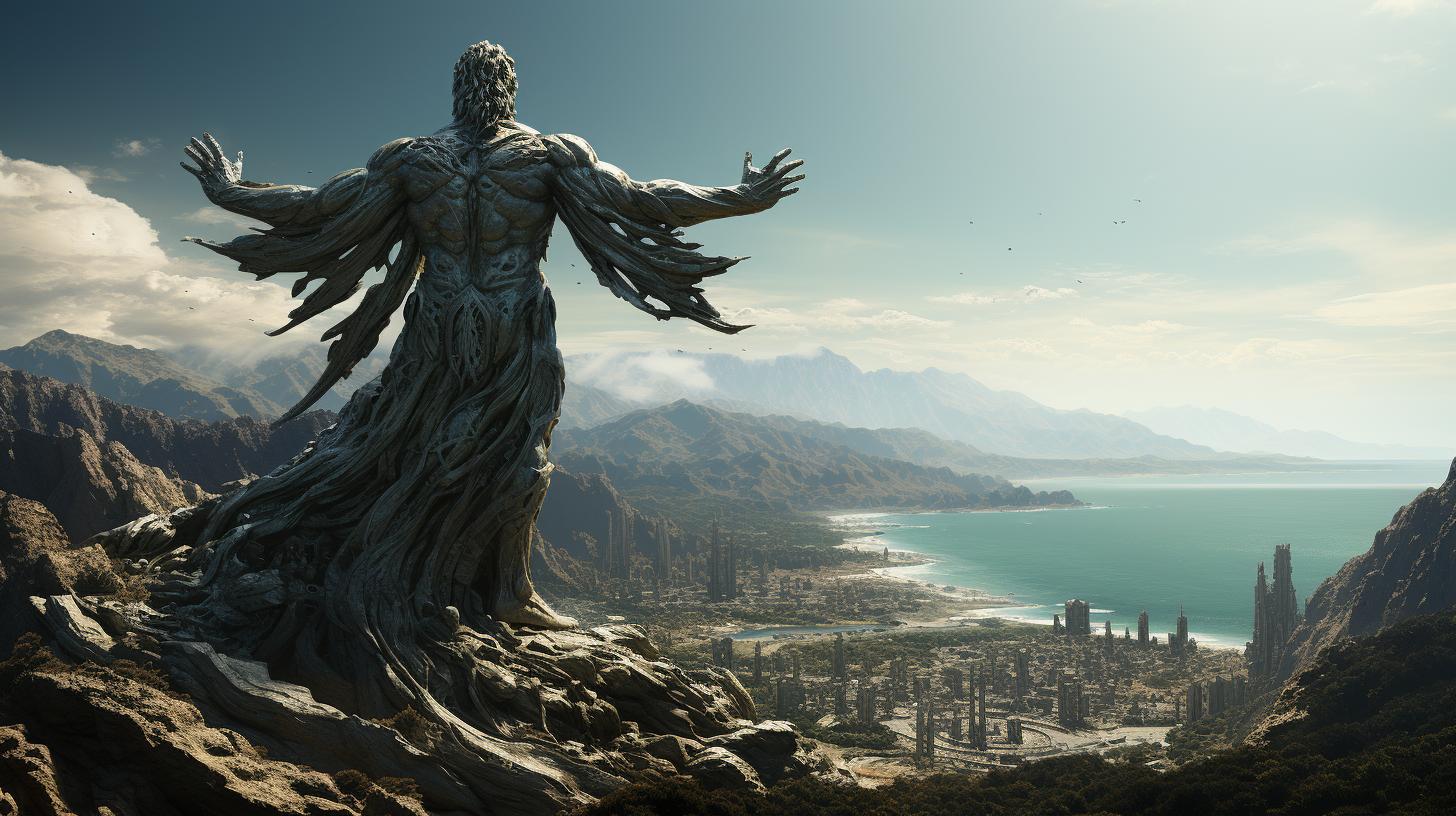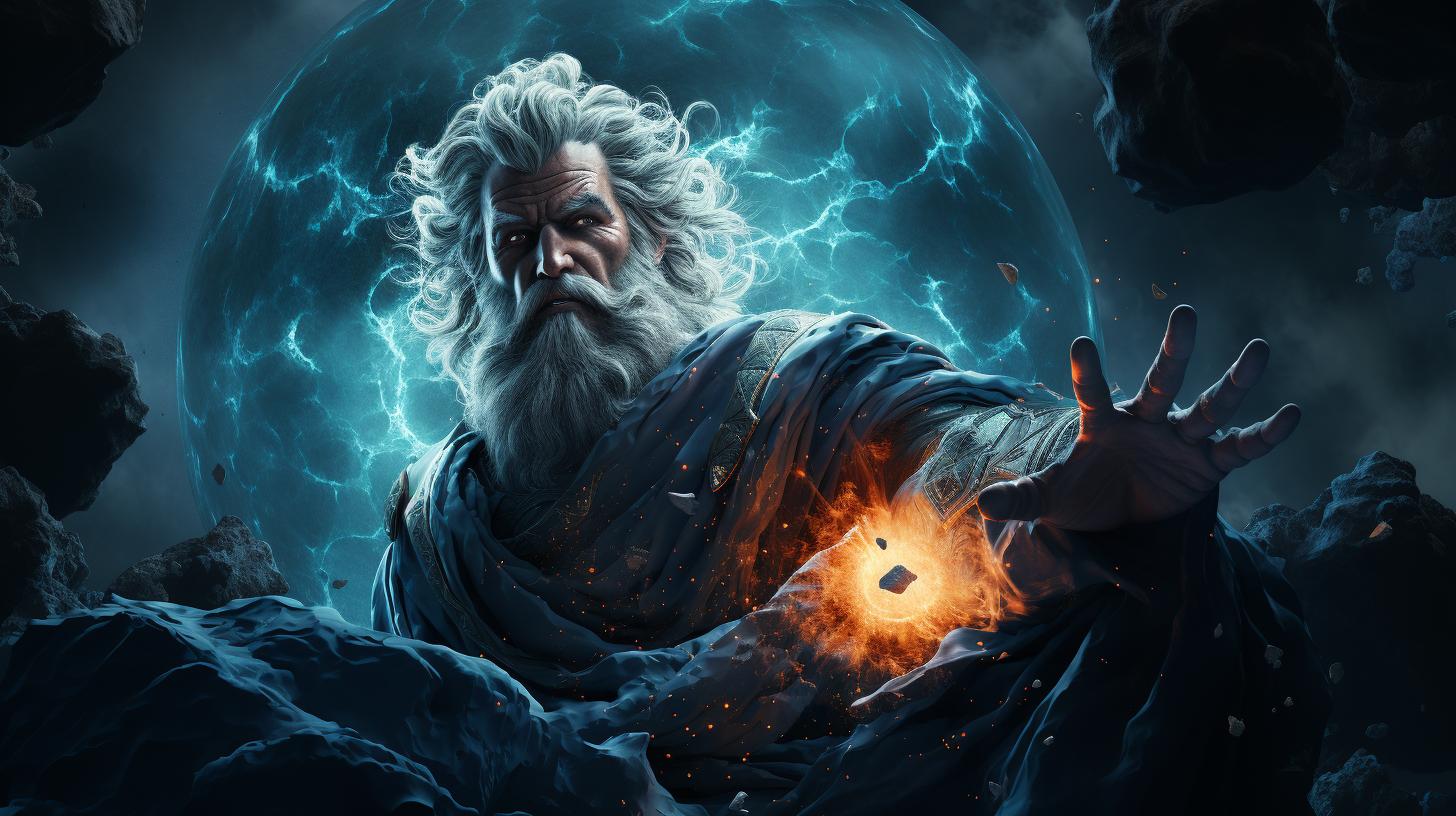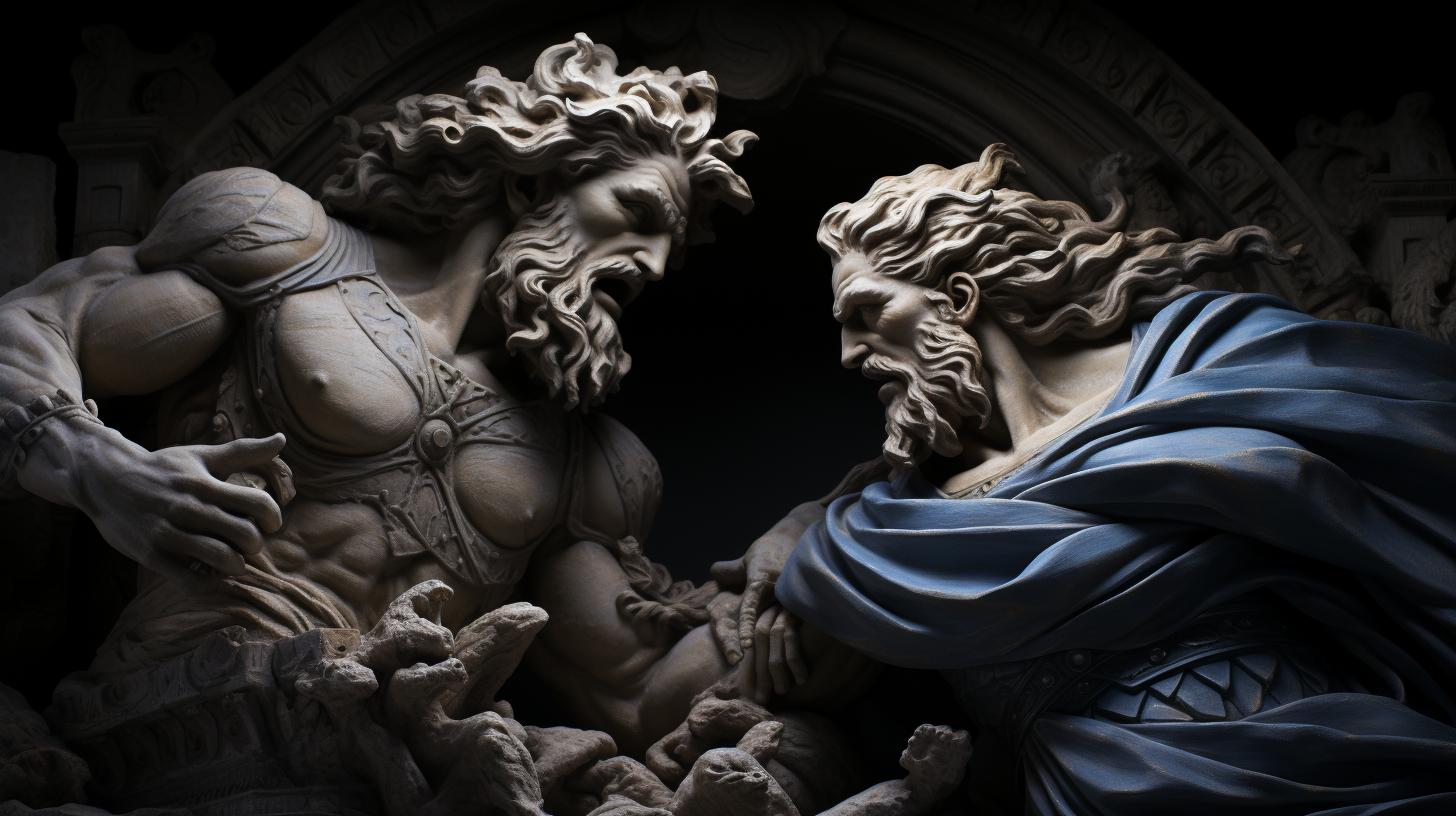What Was Atlas the Titan of: Exploring the Mythology and Role of Atlas in Greek Culture

Atlas, a prominent figure in Greek mythology, was known as the Titan who bore the weight of the heavens as punishment for his involvement in the war against Zeus. He also held the pillars that separated the earth and sky.
Atlas interacted with Greek heroes such as Heracles, who sought his assistance in obtaining the Golden Apples, and Perseus, who transformed him into the mountain Atlas. His legacy extends to his famous offspring, including the Hesperides and the Pleiades.
The name “Atlas” has become synonymous with map collections, while the Atlantic Ocean derives its name from the “Sea of Atlas.”
The Mythology of Atlas: Exploring the Greek Titan and his Role
In Greek mythology, Atlas holds an important place as a prominent Titan.
This section delves into the origins and family of Atlas, his punishment of bearing the heavens and holding the pillars, as well as alternative interpretations that suggest his role as the guardian of earth and sky.
The Origins and Family of Atlas
Atlas was born to Iapetus and Clymene or Asia, making him a member of the renowned Titan family. He had three famous brothers – Menoetius, Prometheus, and Epimetheus. Together, they played significant roles in Greek mythology.
As one of the Titans, Atlas possessed immense power and influence.
Punishment: Bearing the Heavens and Holding the Pillars
Atlas’s fate took a dramatic turn when he participated in the war against Zeus. As punishment for his actions, he was assigned the arduous task of bearing the heavens on his shoulders.
This eternal burden showcased the magnitude of his transgressions and underscored Zeus’s authority over the gods.
Furthermore, Atlas was also tasked with holding the pillars that separated the earthly and celestial realms. This role emphasized his pivotal position in maintaining the cosmic order and stability of the universe.
Alternative Interpretations: Atlas as the Guardian of Earth and Sky
Although Atlas’s primary punishment involved bearing the weight of the heavens, some interpretations attribute him as the guardian of the earth and sky. As the overseer of these realms, Atlas was seen as an instrumental force in preserving the balance between the mortal world and the divine realm.
These alternative interpretations highlight the complex nature of Atlas’s role, showcasing him not only as a condemned figure but also as a guardian of cosmic harmony. His connection to the earth, sky, and human knowledge adds different dimensions to his mythology.
Atlas and his Interactions with Greek Heroes
Atlas, the Greek Titan, played a significant role in various mythological stories that involved interactions with renowned Greek heroes. These tales brought about fascinating adventures and intricate connections between Atlas and these heroic figures.
Heracles and the Quest for the Golden Apples
One of the most well-known encounters between Atlas and a Greek hero is the story of Heracles and the quest for the Golden Apples of the Hesperides. Heracles, as part of his Twelve Labors, was tasked with retrieving these mythical fruits.
However, the apples were guarded by the Hesperides, who were under the watchful eyes of Atlas.
Heracles, cunning and resourceful, devised a plan to convince Atlas to retrieve the apples for him.
Knowing the burden Atlas bore, Heracles offered to shoulder the weight of the heavens while Atlas fetched the apples. Atlas, eager to be relieved of his eternal duty, agreed, allowing Heracles to succeed in his mission.
Perseus and the Transformation of Atlas
Another notable encounter with Atlas was with the hero Perseus. In his quest to slay the Gorgon Medusa, Perseus sought refuge in Atlas’ realm. However, Atlas, renowned for his pride and arrogance, initially refused to aid Perseus.
In response to Atlas’ defiance, Perseus used Medusa’s head, which had the power to turn anyone who looked at it into stone. Perseus showcased this power by transforming Atlas into the Atlas Mountains, a massive range that stands as a testament to Atlas’ once-mighty presence.
Other Encounters: Mythological Stories Involving Atlas
Beyond his interactions with Heracles and Perseus, Atlas appears in various other mythological narratives. In one account, it is said that Atlas led the Titans in the war against the Olympian gods, including Zeus.
Additonally, Atlas is associated with the myth of the quest for the Golden Fleece.
As one of the trials faced by Jason and the Argonauts, they encountered Atlas while searching for the legendary Golden Fleece. Although the specifics of their encounter may vary in different versions of the story, it further highlights Atlas’ involvement in Greek hero tales.
In summary, Atlas’s interactions with Greek heroes such as Heracles and Perseus played significant roles in their respective quests and adventures. These encounters showcased Atlas’ burden as the holder of the heavens and highlighted his character traits of pride and arrogance.
The impacts of these encounters, whether in the form of relief from his eternal duty or transformation into natural landmarks, carried lasting significance within Greek mythology.
Atlas’ Legacy and Symbolism
Atlas, the Greek titan, left behind a rich legacy deeply rooted in mythology and continues to inspire numerous aspects of Greek culture and beyond.
From his notable offspring to his influence in various domains, Atlas’ impact is far-reaching.
Descendants and Notable Offspring of Atlas
One of the remarkable aspects of Atlas’ legacy is his extensive lineage, which includes famous descendants and offspring. Among them are the Hesperides, known as the nymphs who guarded the golden apples, and the Pleiades, a renowned group of seven sisters.
The Hades and the Hyades also trace their origins back to Atlas, further illustrating his significant role in Greek mythology.
The Influence of Atlas in Greek Culture and beyond
Atlas’ influence extends beyond the realm of mythology and permeates various aspects of Greek culture.
His representation as the bearer of the heavens and the guardian of the earth and sky symbolizes the struggle, burden, and responsibilities that individuals face. His story serves as a metaphor for endurance and resilience, resonating with people in different walks of life.
Furthermore, Atlas’ association with astronomy and his role as the deity who moves the heavens have shaped celestial observations and human understanding of the cosmos.
Atlas’ Associations with Geography and Astronomy
Given his connection to the heavens, it is no surprise that Atlas is also linked to geography.
The famous Atlas Mountains in northwest Africa bear his name, and they were believed to be his dwelling place. Moreover, the concept of atlases, collections of maps, has its etymology rooted in the name ‘Atlas.’
These associations highlight the interdisciplinary significance of Atlas, bridging mythology, astronomy, and geography.
In conclusion, Atlas’ legacy encompasses his notable descendants, his influence in shaping Greek culture, and his associations with geography and astronomy.
As an enduring mythical figure, Atlas symbolizes strength, endurance, and the intricate relationship between humans, the heavens, and the earth.
Espero que esta información sea útil para tu artículo sobre ‘what was Atlas the titan of’.
Modern Interpretations and References to Atlas
Modern literature and artistic representations have often drawn inspiration from the mythological figure of Atlas, adding their own interpretations and perspectives to his story. In this section, we will explore how Atlas has been portrayed in literature, art, and popular culture.
Atlas in Literature: Ovid’s Metamorphoses and Hesiod’s Theogony
Renowned Roman poet Ovid, in his epic poem Metamorphoses, includes the story of Atlas and his punishment of holding the heavens. Ovid presents Atlas as a tragic figure burdened with an eternal task.
Similarly, the ancient Greek poet Hesiod, in his Theogony, also mentions Atlas as one of the Titans and his role in the divine hierarchy.
Atlas in Art and Sculpture
Throughout history, artists have depicted Atlas in various forms of art and sculpture. From ancient Greek and Roman sculptures to Renaissance paintings, Atlas is often portrayed as a muscular figure straining under the weight of the celestial sphere.
These artistic representations capture the dramatic nature of Atlas’ punishment and his significant role in Greek mythology.
Atlas in Popular Culture: Films, Books, and Other Representations
The enduring myth of Atlas has also made its way into popular culture, inspiring numerous films, books, and other forms of media. From adventure stories to science fiction, Atlas often appears as a symbolic character, representing strength, endurance, or even a burdened existence.
Films like “Percy Jackson & The Olympians: The Titan’s Curse” and “Wrath of the Titans” feature Atlas as a key figure, showcasing his fascinating role in mythical narratives.
In addition, Atlas has become a symbol in the business world, often representing strength, reliability, and a global outlook.
Many companies have adopted the name “Atlas” or incorporate Atlas-inspired imagery in their logos, signifying their robustness and expansive reach.
- In literature, Atlas is depicted as a tragic figure burdened with an eternal task in Ovid’s Metamorphoses and Hesiod’s Theogony.
- Artistic representations of Atlas showcase his role as a muscular figure straining under the weight of the celestial sphere.
- In popular culture, Atlas has inspired films, books, and other media, often appearing as a symbolic character representing strength or endurance.
- Atlas has also become a symbol in the business world, signifying strength, reliability, and a global outlook.
This multitude of interpretations and references to Atlas demonstrates the enduring appeal and significance of this mythological titan in contemporary society.
Exploring the Atlas Mountains and the Island of Atlantis
Exploring the Atlas Mountains and the legendary Island of Atlantis opens up a fascinating realm of myth and geography. These two interconnected subjects have captured the imagination of historians, explorers, and mythologists for centuries.
Let’s delve into the connection between the Atlas Mountains and the mythological figure, Atlas, as well as trace the origins of the famous lost island of Atlantis back to him.
The Atlas Mountains: Connection to the Mythological Atlas
Situated in the northwest region of Africa, the Atlas Mountains span through Morocco, Algeria, and Tunisia.
These majestic mountains have a rich historical significance, believed to be named after the Titan Atlas. According to ancient Greek lore, Atlas was condemned to hold the heavens on his shoulders, near the edge of the world, where the Atlas Mountains now stand.
These rugged peaks, with their snow-capped summits, play a vital role in shaping the climate and influencing the surrounding regions. The Atlas Mountains served as a prominent landmark for trade routes, explorers, and adventurers throughout history.
Exploring this mountain range allows one to witness not only its natural beauty but also to feel a connection to the mythology that inspired its name.
The Myth of Atlantis: Tracing its Origins to Atlas
The myth of Atlantis, a magnificent advanced civilization lost to the depths of the sea, has intrigued scholars and explorers for generations.
According to Plato, Atlantis was an island nation located beyond the Pillars of Hercules, which are considered to be the Strait of Gibraltar. The story goes that Atlantis was an ambitious and prosperous kingdom established by Poseidon, the god of the sea, and Cleito.
It is believed that the name Atlantis originated from “Atlantis Nesos” in ancient Greek, meaning “Island of Atlas.” This connects the island directly to the mythological figure of Atlas, who was recognized as the father of several notable offspring.
The association between Atlas and Atlantis further deepens the mystery surrounding the legendary lost island.
Controversies and Speculations Surrounding Atlantis
Despite the allure of Atlantis, its existence remains shrouded in mystery and subject to various theories and speculations. Historians and archaeologists continue to debate whether the story of Atlantis was based on real events or if it was merely a fictional creation by Plato.
The lack of definitive evidence has fueled numerous hypotheses, including theories suggesting Atlantis could have been located in the Mediterranean, the Caribbean, or even Antarctica.
Moreover, modern scholarship has proposed alternative interpretations of Atlantis as a metaphorical tale, symbolizing the hubris and downfall of societies.
The captivating nature of the Atlantis myth further contributes to the ongoing debates and fascination surrounding this enigmatic lost civilization.
Exploring the Atlas Mountains and contemplating the elusive existence of Atlantis offers a captivating journey into a world where myth and reality intertwine.
This exploration may not provide all the answers, but it certainly adds to the wonder and intrigue associated with Atlas, his connection to the mountains, and the legendary island of Atlantis.
- The Atlas Mountains have a rich historical significance and are believed to be named after the Titan Atlas.
- The association between Atlas and the Atlas Mountains stems from Greek mythology.
- The myth of Atlantis, believed to be connected to Atlas, adds to the majestic aura of exploration.
- Debates and speculations surrounding Atlantis fuel ongoing scholarly discussions.
Unraveling the Mystery: Fact or Fiction?
Unraveling the mystery surrounding Atlas and his role in mythology brings forth intriguing questions and debates.
Let’s delve into various aspects to determine the factual basis of Atlas’ story and its enduring legacy.
Examining Historical Sources and Ancient Accounts
Historical sources and ancient accounts provide valuable insights into the existence of Atlas and his significance in Greek mythology. References to Atlas can be found in works like Hesiod’s Theogony and Ovid’s Metamorphoses, where his role as a titan and his punishment for defying Zeus are mentioned.
These texts serve as crucial pieces of evidence in understanding the story of Atlas.
Scientific and Archaeological Perspectives on Atlas and Atlantis
From a scientific and archaeological standpoint, exploring the existence of Atlas and the mythical city of Atlantis requires careful evaluation. While there may not be concrete evidence directly linking Atlas to a real historical figure, scholars speculate that the story of Atlas and Atlantis could be based on ancient cultural and geographical knowledge.
Examining geological formations and ancient maps can provide insights into the origins of these legends.
The Significance of Atlas’ Story and its Enduring Legacy
Regardless of the factual basis of Atlas’ story, its significance and enduring legacy cannot be denied. The tale of Atlas, with his eternal burden and connection to the heavens and earth, has captured the human imagination for centuries.
The symbolism behind Atlas, as a representation of celestial forces and the interconnectedness of the world, continues to fascinate and inspire various forms of artistic expression, from literature to sculpture.
- The story of Atlas has influenced numerous works of literature, including Ovid’s Metamorphoses and Hesiod’s Theogony.
- Artists and sculptors have depicted Atlas in various forms, often showcasing his strength and endurance in holding the pillars that separate the earth and sky.
- Throughout popular culture, Atlas is frequently referenced or portrayed, be it in films, books, or other forms of media.
While the true nature of Atlas may remain shrouded in myth and legend, the tale’s allure and enigmatic nature continue to captivate scholars and enthusiasts alike.
Whether seen as a mythical figure or a symbolic representation, Atlas’ story serves as a testament to the enduring power of ancient mythology and its impact on human culture.
.




















